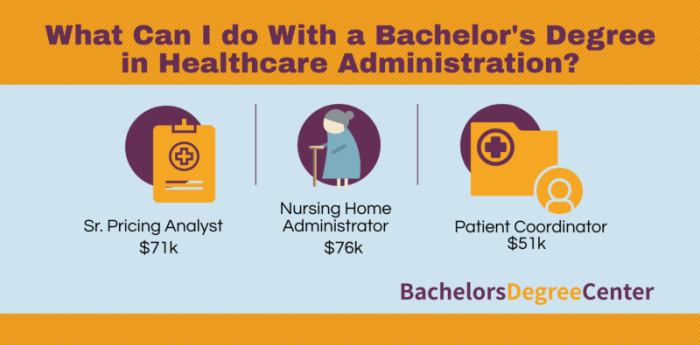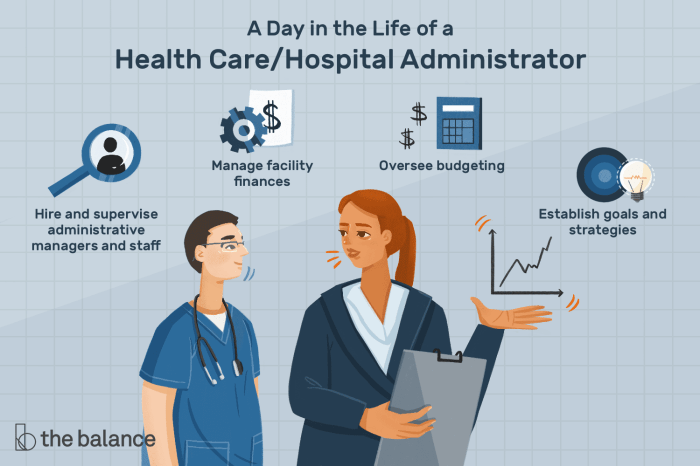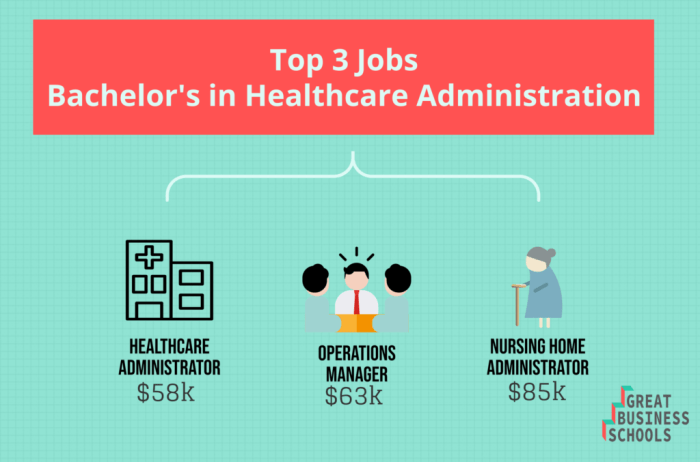Jobs in health care administration are taking center stage as the healthcare industry continues to evolve and expand. With an aging population, technological advancements, and a growing emphasis on preventative care, the demand for skilled healthcare administrators is soaring.
These professionals play a crucial role in ensuring the smooth operation of hospitals, clinics, and other healthcare facilities. They manage finances, oversee operations, and ensure that patient care remains a top priority. This field offers a variety of career paths, from entry-level positions to executive leadership roles, providing opportunities for growth and advancement.
The Growing Demand for Healthcare Administrators

The healthcare industry is experiencing a surge in demand for skilled professionals, particularly in healthcare administration. This growth is driven by a confluence of factors, including an aging population, advancements in medical technology, and the increasing complexity of healthcare systems.
Factors Contributing to the Demand
The need for healthcare administrators is driven by several key factors:
- An Aging Population:As the population ages, the demand for healthcare services increases significantly. This surge in demand necessitates more healthcare administrators to manage the growing volume of patients and services.
- Technological Advancements:The healthcare industry is rapidly adopting new technologies, from electronic health records (EHRs) to telehealth platforms. Managing these technologies requires skilled administrators who can navigate complex systems and ensure efficient implementation.
- Increased Healthcare Complexity:The healthcare landscape is becoming increasingly complex, with evolving regulations, payment models, and patient needs. Healthcare administrators play a crucial role in navigating these complexities and ensuring smooth operations.
Projected Growth of Healthcare Administration Jobs
The Bureau of Labor Statistics (BLS) projects a significant growth in healthcare administration jobs in the coming years. The BLS predicts that employment of medical and health services managers will grow by 28% from 2020 to 2030, much faster than the average for all occupations.
This growth is fueled by several factors, including the increasing demand for healthcare services, the expansion of healthcare facilities, and the need for skilled professionals to manage complex healthcare systems.
Impact of Technological Advancements and Changing Demographics
Technological advancements and changing demographics are having a profound impact on the healthcare administration field. The adoption of EHRs and other healthcare technologies requires administrators with strong analytical skills and the ability to manage complex data systems. The increasing diversity of the patient population also necessitates administrators who are culturally competent and sensitive to the unique needs of diverse communities.
Key Responsibilities of Healthcare Administrators: Jobs In Health Care Administration

Healthcare administrators play a crucial role in the efficient and effective operation of healthcare organizations. Their responsibilities encompass a wide range of areas, from financial management to patient care.
Financial Management
Healthcare administrators are responsible for managing the financial health of the organization. This includes developing and implementing budgets, controlling expenses, and ensuring that the organization is financially sustainable.
“Healthcare administrators are responsible for managing the financial health of the organization. This includes developing and implementing budgets, controlling expenses, and ensuring that the organization is financially sustainable.”
Jobs in healthcare administration involve managing the operational and financial aspects of healthcare organizations. This includes tasks like budgeting, staffing, and ensuring compliance with regulations. A key component of this work often involves understanding different health insurance plans, such as those offered by UnitedHealthcare, which provides a range of health plans and programs.
United Health Cards are essential for accessing these plans, and healthcare administrators need to be knowledgeable about them to ensure smooth patient care and financial stability.
- Developing and managing budgets: This involves allocating funds to different departments and programs, monitoring spending, and making adjustments as needed.
- Controlling expenses: Healthcare administrators must find ways to reduce costs without compromising quality of care. This may involve negotiating contracts with suppliers, implementing cost-saving measures, and streamlining processes.
- Ensuring financial sustainability: This involves making sure that the organization has enough revenue to cover its expenses and meet its long-term goals. This may involve seeking funding from government agencies, private donors, or other sources.
Operations
Healthcare administrators are responsible for the day-to-day operations of the organization. This includes managing staff, scheduling appointments, and ensuring that the facility is clean and safe.
- Managing staff: This involves hiring, training, and supervising employees, as well as addressing any personnel issues.
- Scheduling appointments: Healthcare administrators must ensure that patients are seen in a timely manner, and that there are enough resources available to meet demand.
- Maintaining facilities: This includes ensuring that the facility is clean, safe, and in good repair. This may involve overseeing maintenance, repairs, and renovations.
Human Resources
Healthcare administrators are responsible for managing the human resources of the organization. This includes recruiting and hiring staff, training and developing employees, and addressing any employee relations issues.
- Recruiting and hiring staff: Healthcare administrators must find qualified candidates to fill open positions, and then interview and hire the best candidates.
- Training and developing employees: This involves providing employees with the skills and knowledge they need to perform their jobs effectively. This may involve offering training programs, mentoring, or other forms of development.
- Addressing employee relations issues: Healthcare administrators must address any employee relations issues that arise, such as conflicts between employees, disciplinary issues, or complaints.
Patient Care
Healthcare administrators play a role in ensuring that patients receive high-quality care. This includes developing policies and procedures that promote patient safety, coordinating care between different departments, and resolving patient complaints.
- Developing policies and procedures: Healthcare administrators must develop policies and procedures that ensure patient safety, such as infection control protocols, medication management protocols, and patient privacy protocols.
- Coordinating care: Healthcare administrators must coordinate care between different departments, such as ensuring that patients receive the necessary tests, treatments, and follow-up care.
- Resolving patient complaints: Healthcare administrators must investigate and resolve patient complaints, and make sure that patients are treated fairly and with respect.
Essential Skills and Qualifications

A successful career in healthcare administration requires a unique blend of technical and soft skills. Healthcare administrators need to be adept at managing complex systems, navigating regulations, and effectively communicating with diverse stakeholders.
Essential Skills
The skills needed for healthcare administration are crucial for managing operations, ensuring quality care, and achieving organizational goals.
- Analytical Skills:Healthcare administrators must be able to analyze data, identify trends, and make informed decisions based on evidence. This involves evaluating performance metrics, financial statements, and patient data to assess operational efficiency, identify areas for improvement, and make strategic decisions.
Jobs in health care administration are varied and offer many opportunities for growth. You might find yourself managing a team of nurses, overseeing patient records, or even working on budgets. But after a long day, you’ll need to unwind! Why not find some stress relief with a zumba fitness class near you ?
It’s a great way to de-stress and boost your energy, making you even more effective in your health care administration role.
For example, analyzing patient satisfaction surveys to identify areas for improvement in patient care.
- Financial Management Skills:Healthcare administrators need to understand and manage budgets, negotiate contracts, and ensure financial sustainability. This includes developing and implementing financial strategies, managing resources effectively, and ensuring compliance with financial regulations. For example, creating a budget for a new healthcare facility, negotiating contracts with insurance providers, and ensuring compliance with Medicare and Medicaid regulations.
- Problem-Solving Skills:Healthcare administrators often face complex challenges, from staffing shortages to regulatory changes. They need to be able to think critically, identify solutions, and implement effective strategies to address these issues. For example, developing a plan to address a staffing shortage, resolving a conflict between two departments, or implementing a new patient safety protocol.
- Organizational Skills:Healthcare administrators need to be highly organized and efficient in managing multiple tasks and priorities. This involves prioritizing tasks, managing time effectively, and ensuring that all operations run smoothly. For example, managing multiple projects simultaneously, organizing meetings and events, and ensuring that all deadlines are met.
- Technology Skills:Healthcare administrators need to be comfortable using technology to manage data, communicate, and streamline operations. This includes using electronic health records (EHRs), patient portals, and other software applications. For example, using an EHR system to track patient records, using a patient portal to communicate with patients, and using a scheduling software to manage appointments.
Soft Skills
Soft skills are essential for building relationships, motivating teams, and fostering a positive work environment.
- Communication Skills:Healthcare administrators need to communicate effectively with patients, staff, physicians, and other stakeholders. This includes listening attentively, conveying information clearly, and resolving conflicts constructively. For example, explaining complex medical information to patients, mediating disputes between staff members, and presenting financial reports to the board of directors.
- Leadership Skills:Healthcare administrators need to be able to inspire and motivate teams to achieve organizational goals. This includes setting clear expectations, delegating tasks effectively, and providing feedback and recognition. For example, leading a team to implement a new patient care protocol, motivating staff to improve patient satisfaction scores, and creating a positive and supportive work environment.
Jobs in health care administration are diverse and essential, encompassing everything from managing budgets and staff to developing patient care strategies. A great example of a company with a strong focus on health and wellness is genesis health clubs , where administrative roles play a crucial part in ensuring the smooth operation of their facilities and the satisfaction of their members.
These administrative positions can offer a rewarding career path for individuals interested in contributing to the health and well-being of others.
- Interpersonal Skills:Healthcare administrators need to be able to build strong relationships with a diverse range of individuals. This includes being empathetic, respectful, and understanding of different perspectives. For example, working collaboratively with physicians, nurses, and other healthcare professionals, building relationships with community leaders, and fostering positive relationships with patients and their families.
Educational Qualifications and Certifications
The educational qualifications and certifications needed for a career in healthcare administration vary depending on the specific role and level of responsibility.
- Entry-Level Roles:A bachelor’s degree in healthcare administration, business administration, or a related field is typically required for entry-level positions. These positions may involve assisting with administrative tasks, coordinating patient care, or managing specific departments. Examples include:
- Healthcare Administrator Assistant
- Medical Office Manager
- Patient Care Coordinator
- Advanced Roles:For more advanced roles, such as Director of Operations or Chief Executive Officer (CEO), a master’s degree in healthcare administration (MHA) or a related field is often preferred. These programs provide in-depth knowledge of healthcare policy, finance, and management. Examples include:
- Hospital Administrator
- Director of Nursing
- Chief Operating Officer (COO)
- Certifications:Professional certifications can enhance career prospects and demonstrate specialized knowledge and skills. The American College of Healthcare Executives (ACHE) offers the Certified Healthcare Executive (CHE) credential, which is a widely recognized and respected certification in the field. Other certifications include:
- Certified Medical Practice Executive (CMPE)
- Certified Healthcare Financial Professional (CHFP)
- Certified Professional in Healthcare Quality (CPHQ)
Challenges and Opportunities in the Field

Healthcare administration, while rewarding, presents a unique set of challenges and opportunities. Navigating the complex healthcare landscape requires a blend of business acumen, strategic thinking, and a deep understanding of the industry’s intricacies.
Challenges in Healthcare Administration
The healthcare industry is constantly evolving, posing various challenges for administrators.
- Managing Costs:Healthcare costs are rising, putting pressure on administrators to find ways to optimize resource allocation and control expenses. This involves negotiating contracts with providers, implementing cost-saving measures, and leveraging data analytics to identify areas for improvement.
- Navigating Regulations:The healthcare industry is heavily regulated, with numerous federal and state laws governing operations. Administrators must stay abreast of evolving regulations, ensure compliance, and adapt their practices accordingly.
- Adapting to Technological Changes:The healthcare industry is rapidly adopting new technologies, such as electronic health records (EHRs), telehealth, and artificial intelligence (AI). Administrators must embrace these changes, implement new systems, and train staff to effectively utilize these technologies.
Opportunities in Healthcare Administration
The challenges facing the healthcare industry also present opportunities for administrators to make a significant impact.
- Telehealth:The rise of telehealth has created new opportunities for administrators to expand access to care and improve patient satisfaction. This involves developing telehealth programs, integrating technology, and addressing regulatory considerations.
- Data Analytics:Data analytics is becoming increasingly important in healthcare, enabling administrators to make data-driven decisions, improve efficiency, and enhance patient care. This involves leveraging data to identify trends, predict outcomes, and optimize resource allocation.
- Population Health Management:Population health management focuses on improving the health of entire populations, rather than just individual patients. Administrators can play a crucial role in implementing population health programs, coordinating care across different settings, and promoting healthy lifestyles.
Challenges and Opportunities Across Different Healthcare Settings
The challenges and opportunities faced by healthcare administrators vary across different settings, such as hospitals, clinics, and insurance companies.
| Setting | Challenges | Opportunities |
|---|---|---|
| Hospitals | – Managing complex operations
|
– Implementing innovative technologies
|
| Clinics | – Smaller budgets
|
– Specializing in niche areas
|
| Insurance Companies | – Navigating regulatory changes
|
– Developing innovative insurance products
|
The Future of Healthcare Administration

The healthcare landscape is undergoing a rapid transformation, driven by technological advancements, changing demographics, and evolving patient expectations. This evolution presents both challenges and opportunities for healthcare administrators, who play a critical role in navigating these changes and ensuring the efficient and effective delivery of care.
Impact of Technological Advancements
The healthcare industry is embracing technology at an unprecedented pace, and healthcare administrators will need to adapt and leverage these advancements to improve operational efficiency, enhance patient care, and remain competitive. Artificial intelligence (AI), big data analytics, and personalized medicine are poised to significantly impact the field.
Artificial Intelligence and Big Data, Jobs in health care administration
AI and big data analytics are transforming how healthcare is delivered and managed. AI-powered tools can analyze vast amounts of patient data, identifying patterns and trends that can inform clinical decision-making, optimize resource allocation, and improve patient outcomes.
AI-driven chatbots are already being used to answer patient questions, schedule appointments, and provide basic medical advice.
Big data analytics can help healthcare administrators track patient populations, identify high-risk individuals, and predict future healthcare needs. This information can be used to develop targeted interventions, improve population health management, and optimize resource allocation.
Personalized Medicine
Personalized medicine is an emerging approach that tailors healthcare to the individual patient’s unique genetic makeup, lifestyle, and medical history. This approach promises to improve treatment effectiveness, reduce adverse drug reactions, and enhance patient satisfaction. Healthcare administrators will need to adapt to this shift by implementing systems that support personalized care, including data management, genetic testing, and patient education.
Future Job Roles and Skills
The evolving healthcare landscape will create new job roles and demand for specialized skills in healthcare administration.
Future Job Roles and Skills
| Job Role | Skills |
|---|---|
| AI and Data Analytics Specialist | Data analysis, machine learning, AI algorithms, data visualization, cybersecurity |
| Population Health Manager | Epidemiology, public health, data analysis, health policy, community outreach |
| Personalized Medicine Coordinator | Genetics, genomics, patient education, data management, clinical trial coordination |
| Healthcare Technology Consultant | Healthcare IT systems, software implementation, data security, cloud computing, change management |
| Telehealth Administrator | Telemedicine platforms, virtual care delivery, patient engagement, remote monitoring technologies, cybersecurity |
Last Word

The future of healthcare administration is bright, with exciting opportunities emerging in areas like telehealth, data analytics, and population health management. As the healthcare landscape continues to change, the role of healthcare administrators will become even more vital. If you are looking for a rewarding and challenging career that makes a real difference in people’s lives, a career in healthcare administration might be the perfect fit.
Essential Questionnaire
What are the salary expectations for healthcare administrators?
Salaries for healthcare administrators vary depending on experience, location, and the specific role. Entry-level positions typically start around $50,000 per year, while experienced professionals can earn over $100,000 annually.
What are the educational requirements for a career in healthcare administration?
A bachelor’s degree in healthcare administration, business administration, or a related field is typically required for entry-level positions. Advanced roles may require a master’s degree in healthcare administration (MHA) or a Master of Business Administration (MBA) with a healthcare focus.
What are the job prospects for healthcare administrators?
Job prospects for healthcare administrators are excellent, with the Bureau of Labor Statistics projecting significant growth in the field over the next decade. The aging population and increasing demand for healthcare services will continue to drive this growth.